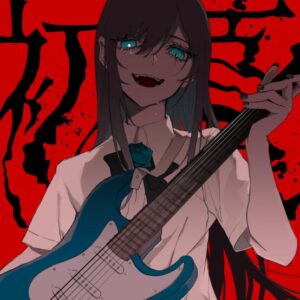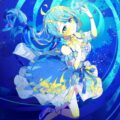 Introduction
Introduction
Artist:Ado
Songname: Shoka(初夏)
“Shoka” is a song that Ado had initially created at the age of 17, and it has been refined and completed as she matured into adulthood. The arrangement of the track is handled by Mitsui Ritsuro, a guitarist and arranger known for his work on the music for the anime “Bokutachi wa Benkyou ga Dekinai!” The sound is described as an alternative rock band sound that captures the essence of a twisted youth, complemented by Ado’s passionate vocals.
In addition to the CD release, “Shoka” was made available for pre-release streaming on October 14, and the music video premiered on YouTube at 8 PM the same day. The cover art for the single is an original illustration by Orihara, who also serves as Ado’s image director, depicting Ado with a guitar, creating a striking visual impact.
Ado has expressed her desire for listeners to experience her true feelings and the raw parts of herself through “Shoka,” which she hopes will resonate with those who have heard it during her tour and those who will discover it for the first time. The song is a reflection of her growth and a testament to her artistic evolution.
Translation
| Original | Translation | ||
|---|---|---|---|
| 1 | 死にたい死にたいって縋ってたって何にも意味ないな | 1 | I don’t mean anything to death |
| 2 | 僕は知らないんだ 形あるもの全てに終わりが来るこ | 2 | I don’t know what is in shape |
| 3 | と。 | 3 | . |
| 4 | 最底、酩酊で、ありのままの、無茶苦茶な歌詞では | 4 | At the bottom, drunkenness, and unpleasant lyrics |
| 5 | 救えない命がいくつもある | 5 | There are many lives that can’t be saved |
| 6 | 6 | ||
| 7 | 傷つけて、傷つけて 報われようとしているのか? | 7 | Are you hurt, hurt, and rewarded? |
| 8 | 「幸せになれる……!」とか?笑 | 8 | Can you be happy? Laugh |
| 9 | 9 | ||
| 10 | 初夏の風にまたや酔わされて | 10 | Drunk in the early summer wind |
| 11 | 自惚れた自我を歌ってしまう | 11 | Sing one’s self |
| 12 | 正しい答えがわからない、だから | 12 | I don’t know the right answer |
| 13 | 教えて | 13 | Teach |
| 14 | 教えて! | 14 | Tell me! |
| 15 | 15 | ||
| 16 | 好きだった言葉は壊されてしまいました | 16 | The words I liked were broken |
| 17 | いつか報われると信じていたのに | 17 | Although I believed it would be rewarded someday |
| 18 | 積み上げたこの声はこの世界の不正解だ | 18 | This voice raised is an incorrect solution in this world |
| 19 | 「何も知らないその顔が嫌い。」 | 19 | “I don’t like the face I know nothing.” |
| 20 | 何十回何百何千回だって | 20 | Hundreds of times thousands of times |
| 21 | 死にたいんだ | 21 | I want to die |
| 22 | 22 | ||
| 23 | 僕は僕は、僕は馬鹿だった 水溜る箱庭 | 23 | I am stupid, I am a booming bodgarden |
| 24 | 傷口を塞ぐために また自慰を繰り返す | 24 | Repeat masturbation to cover the wound |
| 25 | 呆れた横顔 | 25 | A surprising profile |
| 26 | 夜明け前の夢より綺麗な言葉を並べても | 26 | Even if I arrange words more beautiful than the dream before dawn |
| 27 | 美しく枯れる都会の花火 | 27 | Beautiful urban fireworks |
| 28 | そこに僕はいない 後の祭 | 28 | There is no Festival after me |
| 29 | 29 | ||
| 30 | 言えなかった言葉が 溢れ出して止まらないな | 30 | I can’t stop talking words |
| 31 | 望みを叶えても 変わりゃしなくて | 31 | Even if I grant hope, I will not change |
| 32 | いつの日にか交わした約束は忘れられて | 32 | I forgot the promise that I made up for days |
| 33 | 引き止められず、ここには1人 | 33 | I can’t stop here |
| 34 | 何千回何万何億回だって | 34 | Tens of thousands of millions of times |
| 35 | 殺してくれないか | 35 | Will you kill me? |
| 36 | 36 | ||
| 37 | 倫理が道理を作るのなら | 37 | If ethics makes moral |
| 38 | 嗄れたこの声は正義なの? | 38 | Is this voice hostile justice? |
| 39 | 正しさが常に優しさになるなら | 39 | If correctness always becomes gentleness |
| 40 | 教えて | 40 | Teach |
| 41 | 教えて | 41 | Teach |
| 42 | 教えて | 42 | Teach |
| 43 | 答えて! | 43 | Answer! |
| 44 | 44 | ||
| 45 | 好きだったあの人はもう僕を救わないな | 45 | He who has liked already won’t save me |
| 46 | いつか報われると信じていたのに | 46 | Although I believed it would be rewarded someday |
| 47 | 47 | ||
| 48 | いつの日にか描いた未来はとうに過去になって | 48 | The future which I drew at the last days becomes the past |
| 49 | 「何も知らない」だから、ここで歌う | 49 | I don’t know anything, so sing here |
| 50 | 何十回何百何千回だって | 50 | Hundreds of times thousands of times |
| 51 | 息をしては | 51 | In breath |
| 52 | 何千回何万何億回だって | 52 | Tens of thousands of millions of times |
| 53 | 叫んだんだ | 53 | You shouted |
Meaning
- Desperation and Meaninglessness: The opening lines talk about feeling that crying out in despair (“死にたい死にたいって縋ってたって何にも意味ないな”) is ultimately pointless, as everything in life will eventually come to an end (“形あるもの全てに終わりが来ること”).
- Unreachable Salvation: The narrator reflects on the inability of even wild and unrestrained music to save lives that are deeply troubled (“無茶苦茶な歌詞では救えない命がいくつもある”).
- Cycle of Pain and Futility: The lyrics describe a constant cycle of hurting and being hurt (“傷つけて、傷つけて”), questioning whether this suffering is in pursuit of happiness and mocking the naive belief in future happiness (“「幸せになれる……!」とか?笑”).
- Existential Doubt and Need for Guidance: Staggering through life, the narrator is influenced by fleeting moments (like the early summer wind) but still seeks answers to questions about the correctness or truth of their actions, asking repeatedly (“教えて”).
- Broken Dreams and Lost Beliefs: The lyrics mention how the words they once loved have been destroyed, and their belief in eventual reward has crumbled (“好きだった言葉は壊されてしまいました いつか報われると信じていたのに”).
- Injustice and Frustration: The narrator feels that despite their efforts, their voice is seen as incorrect in this world (“積み上げたこの声はこの世界の不正解だ”). There’s also an expression of distaste for ignorance (“「何も知らないその顔が嫌い。」”).
- Recurrence of Suicidal Thoughts: There’s a repetitive and escalating emphasis on the desire to die (“死にたいんだ”, “殺してくれないか”), showing the depth of their despair.
- Self-Destruction and Isolation: The narrator reflects on their own foolishness and self-isolation, unable to stop self-harm as a way of dealing with pain (“また自慰を繰り返す” … “そこに僕はいない”).
- Broken Promises and Solitude: Promises made in the past are forgotten
